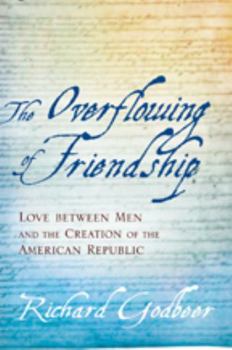The Overflowing of Friendship: Love Between Men and the Creation of the American Republic
Select Format
Select Condition 
Book Overview
When eighteenth-century American men described "with a swelling of the heart" their friendships with other men, addressing them as "lovely boy" and "dearly beloved," celebrating the "ardent affection" that knit their hearts in "indissoluble bonds of fraternal love," their families, neighbors, and acquaintances would have been neither surprised nor disturbed. Richard Godbeer's groundbreaking new book examines loving and sentimental friendships...
Format:Paperback
Language:English
ISBN:1421413833
ISBN13:9781421413839
Release Date:January 2014
Publisher:Johns Hopkins University Press
Length:272 Pages
Weight:0.85 lbs.
Dimensions:0.7" x 6.0" x 8.9"
Grade Range:Postsecondary and higher
Customer Reviews
1 rating
intriguing, though somewhat impressionistic
Published by Thriftbooks.com User , 14 years ago
Godbeer's central argument is a simple one: eighteenth-century Americans tolerated, even admired, intense, passionate friendships between adolescent and adult men, and Revolutionary Americans conceived of these friendships as being an important structural feature of their society. Some of these friendships may have included some degree of sexual engagement, but most seem not to have done so; some were exclusive, but others were multilateral (that is, one man might enjoy passionate friendships with two or several men). Some floundered when the parties married, but many lasted for life. Godbeer's best material is in the introduction, the first two chapters, and the epilogue; these sections will give you a sense of what such "overflowing" friendships entailed and how relatives and peers responded to them. The later chapters lapse into extended anecdotes, which are interesting if you know something about the people involved, but frustrate the reader who is looking for clear and tidy conclusions. The Overflowing of Friendship builds on Godbeer's earlier book, The Sexual Revolution in Early America (2004), by complicating modern notions of such fundamental human impulses as friendship, sexual attraction, and romantic love. Godbeer argues persuasively that eighteenth-century Americans did not automatically link romantic and sexual attraction as we do, nor did they believe that each human being had a fixed sexual orientation. In the concluding pages, Godbeer raises some powerful questions about how Americans understand romantic attraction and sexual orientation today and whether our conceptions of these phenomena confine our emotional lives. I enjoyed The Overflowing of Friendship, but I found it a somewhat less rewarding read than The Sexual Revolution in Early America. Aside from the diffuse quality of chapters 3, 4, and 5, I was concerned that Godbeer did not explicitly note the class bias of his evidence. The Overflowing of Friendship is heavily skewed towards the more affluent, more literate layers of American society; it's not at all clear whether ordinary farmers and artisans, much less sailors, servants, and slaves, indulged in similarly passionate same-sex friendships or whether society tolerated those friendships as readily if they did. Godbeer's work on this topic thus seems more exploratory than definitive. Still, I heartily recommend it if you are interested in the emotional lives of early Americans.






